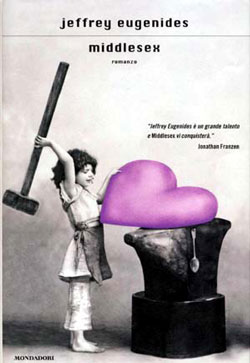
'The first few years, I had a lot of difficulty with the voice. They make their way to Detroit, where they have a cousin, the only person left in the world who knows that they are not only husband and wife and third cousins, but also brother and sister. Desdemona and Lefty Stephanides flee the Turks attacking their Greek village only to find themselves caught up in the sacking of Smyrna. Calliope was the muse of epic poetry and, in the first half of the book, Eugenides's Callie recounts the odyssey of her grandparents' emigration from what is now Turkey to America. The triumph of the novel - and the reason it took so long to write - is its voice. Fate may be down to evolutionary biology now, rather than the gods, but it is still in a fight to the death with free will. In the process, he confronts the possibility that genetic determinism has revived ancient beliefs in destiny, disrupting our post-Freudian assumptions that character is overwhelmingly a product of experience. 'That started me thinking about my Greek heritage and the village my grandparents came from and I realised I could tell a much larger story, the transmission of the gene, told by the final carrier of the gene,' says Eugenides.

A charming, untroubled child, Callie is plunged into psychological and emotional chaos at adolescence when she starts sprouting facial hair, speaking in a deep voice, and falling in love with a girl in her Latin class.ĥ-alpha-reductase deficiency, the particular mutation that afflicts Callie, invariably occurs in inbred communities. Middlesex is the story of Calliope Helen Stephanides, born with a mutation on her fifth chromosome which makes her appear at birth to be a girl, although she is, in fact, biologically and hormonally a boy. The idea was to write a fictional book about a hermaphrodite, and I wanted it to be medically accurate - to be a story of a real hermaphrodite, rather than a fanciful creature like Tiresias or Orlando who could shift in a paragraph to avail myself of the mythological connections without making the character a myth.' I didn't set out to write about the Greek-American experience or originally to write a family saga at all. It's autobiographical at the level of family detail or almost insignificant fact. 'The story I am telling is very far from my own experience, so the only way I felt I could make it credible for me was to borrow from a certain amount of history and personal fact. So it seems appropriate to begin by asking how much of the novel is autobiographical. (He was awarded a grant to write in Berlin for a year and they haven't yet got round to leaving.) The café makes a fleeting appearance in Middlesex, whose hero, like Eugenides, is a Greek-American raised in Detroit and now living in Berlin. I met Jeffrey Eugenides in Café Einstein in Berlin, the city in which he has lived for the past three years with his wife, an artist, and their four-year-old daughter.


 0 kommentar(er)
0 kommentar(er)
